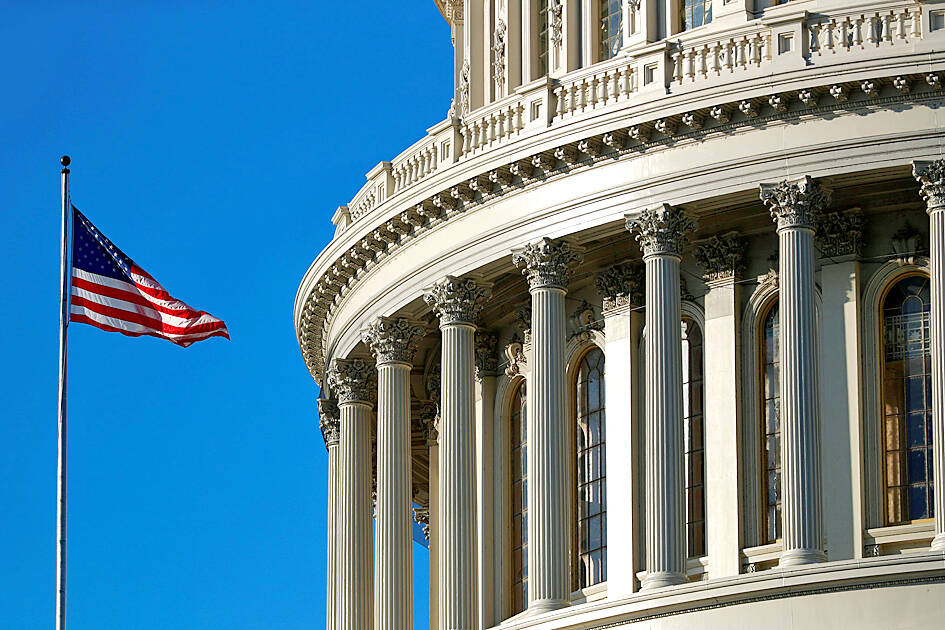While three-quarters of Americans see tensions between Taiwan and China as important to US national interests, older respondents are more concerned about the conflict than their younger counterparts, a Pew Research Center survey published on Friday said.
Thirty percent of respondents view cross-strait tensions as “somewhat important” to US national interests and 45 percent think they are “very important,” the survey of 5,618 US adults from Jan. 22 to Jan. 28 showed.
Asked how important Taiwan-China tensions are to them personally, 34 percent said they view them as “somewhat important,” while 23 percent said they believe they are “very important,” the survey showed.

Photo: Reuters
About 76 percent of Democrats and 78 percent of Republicans said tensions across the Strait are important to US national interests, it showed, suggesting partisanship has little effect on US assessments of the issue.
However, 62 percent of Republicans see tensions between Taiwan and China as important to them personally, higher than the 56 percent of Democrats who hold this view.
Older Americans are more likely to find the Taiwan Strait issue to be important than younger ones, the poll showed.
According to the survey, 88 percent of Americans over 65 years of age and 82 percent of Americans aged 50 to 64 see Taiwan-China tensions as important to US national interests.
Meanwhile, 69 percent of Americans between 30 and 49 years old, and 63 percent of Americans between 18 and 29 years old, view the conflict as important to national interests, the poll showed.
This shows a 25 percentage point difference between the oldest and youngest groups, the poll showed.
The survey revealed that 77 percent of Americans over 65 years old and 65 percent of Americans aged 50 to 64 see cross-strait tensions as important to them personally.
Meanwhile, 48 percent of Americans between 30 and 49 years old and 40 percent of those aged 18 to 29 view the tensions as personally important.
This highlights a 37 percentage point gap between the youngest and oldest Americans in their personal perception of cross-strait tensions.
The survey also covered other conflicts, with 75 percent of Americans saying the Israel-Hamas conflict is important to US interests, while 74 percent see the Russia-Ukraine conflict as important to US interests.
Data from the survey showed that 81 percent of Democrats and 69 percent of Republicans see the war between Russia and Ukraine as important to national interests — a partisan difference of 12 percentage points, the highest among the three conflicts.
The Israel-Hamas conflict is the only crisis seen as personally important by a majority of every age group, although older Americans are still more likely to find personal importance in the conflict than younger ones.
Eighty-one percent of US residents over 65 years of age and 54 percent of those between 18 and 29 years of age see the conflict between Israel and Hamas as personally important, a 16 percentage point difference, the smallest among the three crises.

POSITIVE DEVELOPMENT: Japan and the US are expected to hold in-depth discussions on Taiwan-related issues during the meeting next month, Japanese sources said The holding of a Japan-US leaders’ meeting ahead of US President Donald Trump’s visit to China is positive news for Taiwan, former Japan-Taiwan Exchange Association representative Hiroyasu Izumi said yesterday. After the Liberal Democratic Party’s landslide victory in Japan’s House of Representatives election, Japanese Prime Minister Sanae Takaichi is scheduled to visit the US next month, where she is to meet with Trump ahead of the US president’s planned visit to China from March 31 to April 2 for a meeting with Chinese President Xi Jinping (習近平). Japan and the US are expected to hold in-depth discussions on Taiwan-related issues during the

‘LIKE-MINDED PARTNER’: Tako van Popta said it would be inappropriate to delay signing the deal with Taiwan because of China, adding he would promote the issue Canadian senators have stressed Taiwan’s importance for international trade and expressed enthusiasm for ensuring the Taiwan-Canada trade cooperation framework agreement is implemented this year. Representative to Canada Harry Tseng (曾厚仁) in an interview with the Central News Agency (CNA) said he was increasingly uneasy about Ottawa’s delays in signing the agreement, especially as Ottawa has warmed toward Beijing. There are “no negotiations left. Not only [is it] initialed, we have three versions of the text ready: English, French and Mandarin,” Tseng said. “That tells you how close we are to the final signature.” Tseng said that he hoped Canadian Prime Minister Mark Carney

Taiwan has received more than US$70 million in royalties as of the end of last year from developing the F-16V jet as countries worldwide purchase or upgrade to this popular model, government and military officials said on Saturday. Taiwan funded the development of the F-16V jet and ended up the sole investor as other countries withdrew from the program. Now the F-16V is increasingly popular and countries must pay Taiwan a percentage in royalties when they purchase new F-16V aircraft or upgrade older F-16 models. The next five years are expected to be the peak for these royalties, with Taiwan potentially earning

President William Lai (賴清德) yesterday bestowed one of Taiwan’s highest honors on Saint Vincent and the Grenadines (SVG) Ambassador Andrea Clare Bowman in recognition of her contributions to bilateral ties. “By conferring the Order of Brilliant Star with Grand Cordon on Ambassador Bowman today, I want to sincerely thank her, on behalf of the Taiwanese people, for her outstanding contribution to deepening diplomatic ties between Taiwan and SVG,” Lai said at a ceremony held at the Presidential Office in Taipei. He noted that Bowman became SVG’s first ambassador to Taiwan in 2019 and